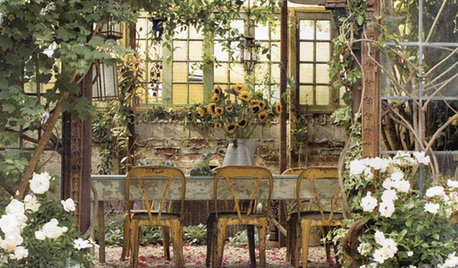Mold on clover that makes horses drool
crAnk
19 years ago
Related Stories

TRANSITIONAL HOMESHouzz Tour: A Happy-Trails Home on a California Field
Horse-loving homeowners look to barns and equestrian references for their light and bright new build
Full Story
HOUZZ TOURSMy Houzz: Better Flow for Feasts and Family in Alabama
Newly open spaces make this home ideal for entertaining, but intimate areas keep things personal
Full Story
HOME OFFICESPhoto Flip: 95 Deskscape Dazzlers
Whether you work from home or just need a stylish space in which to pay the bills, these office spaces make the grade
Full Story
GARDENING AND LANDSCAPINGInterview: Secrets to a Stunning Outdoor Room
Designer Sandy Koepke Shares Her Tricks for Mastering Outdoor Living Spaces
Full Story
HOUZZ TOURSMy Houzz: Going White and Bright in Montreal
White lacquer and wider doorways help create an airer backdrop for colorful contemporary art in a 1910 Arts and Crafts home
Full Story
HOUZZ TOURSHouzz Tour: A Fresh Take on Traditional in Texas
An updated interior design keeps a 1926 home charming yet crisp
Full Story
LIFETrue Confessions of a House Stalker
Letting go when a new owner dares to change a beloved house's look can be downright difficult. Has this ever happened to you?
Full Story
KITCHEN DESIGNThe Cure for Houzz Envy: Kitchen Touches Anyone Can Do
Take your kitchen up a notch even if it will never reach top-of-the-line, with these cheap and easy decorating ideas
Full Story
HOUZZ TOURSMy Houzz: A Condo of Delightful Curiosities in Louisville
Gorgeous vintage finds and eclectic repurposed pieces shine in this dream renovated retirement home
Full Story
FARM YOUR YARDHello, Honey: Beekeeping Anywhere for Fun, Food and Good Deeds
We need pollinators, and they increasingly need us too. Here, why and how to be a bee friend
Full Story





scottlk
ksrogers
Related Professionals
Essex Landscape Architects & Landscape Designers · Middle Island Landscape Architects & Landscape Designers · Hayden Landscape Contractors · Leicester Landscape Contractors · North Highlands Landscape Contractors · Plantation Landscape Contractors · Woodburn Landscape Contractors · Elgin Roofing & Gutters · Wichita Roofing & Gutters · Norwood Roofing & Gutters · Freehold Decks, Patios & Outdoor Enclosures · Lakewood Decks, Patios & Outdoor Enclosures · Midlothian Decks, Patios & Outdoor Enclosures · Richmond Decks, Patios & Outdoor Enclosures · Rocklin Decks, Patios & Outdoor Enclosuresscottlk
ksrogers